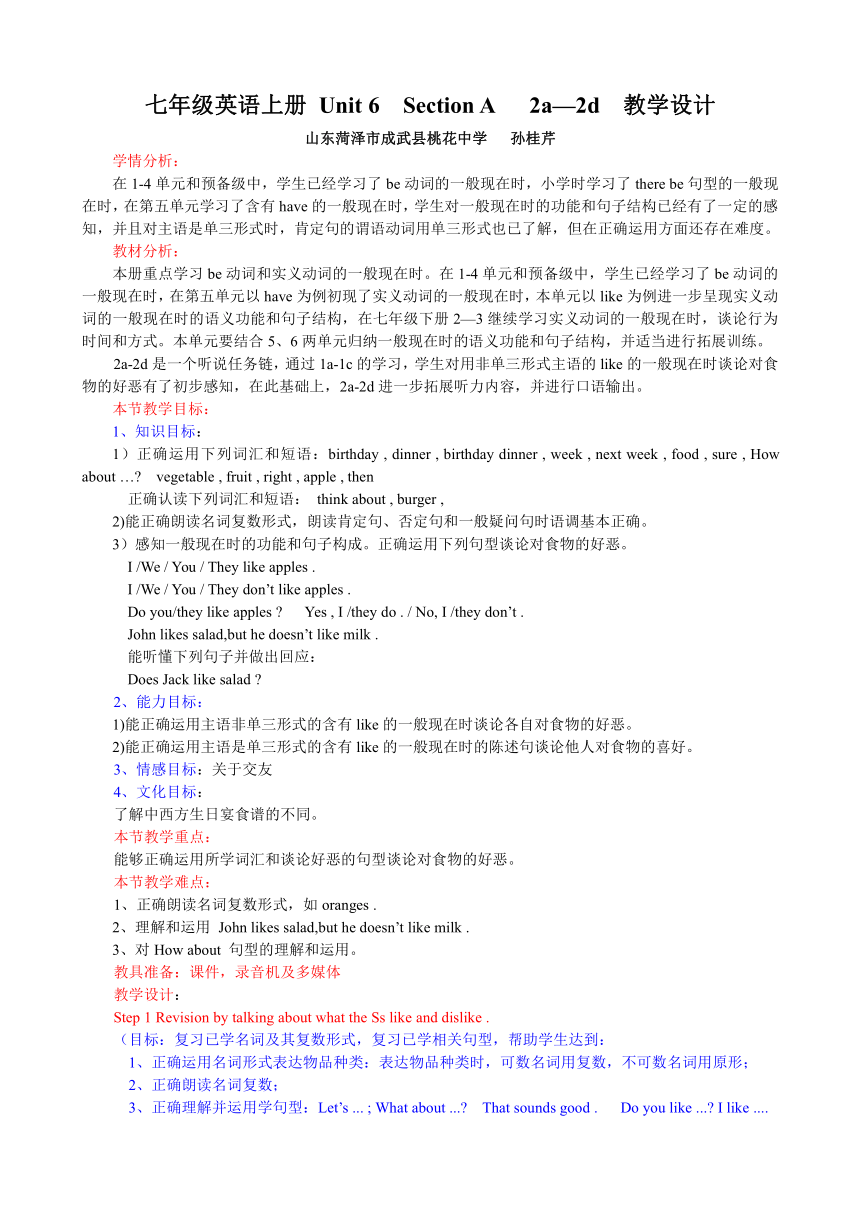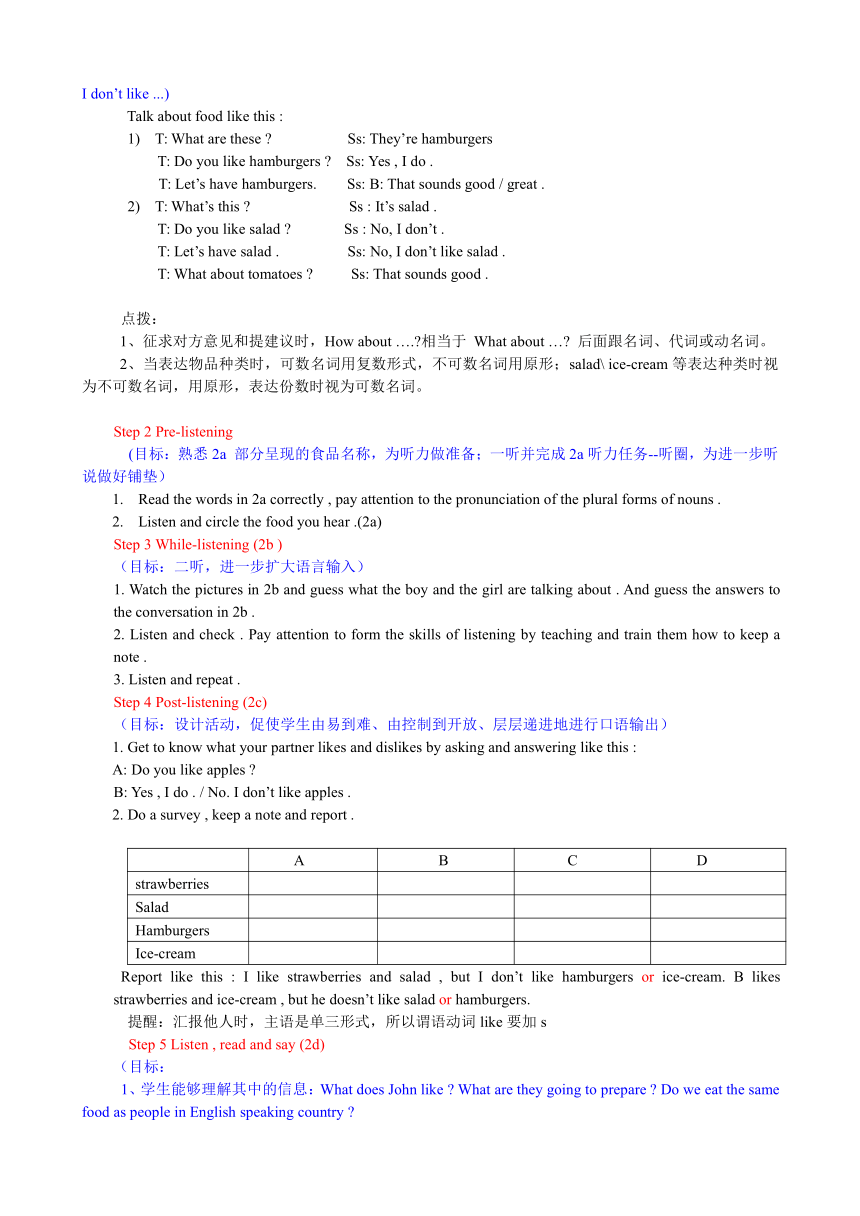Unit 6 Do you like bananas?(Section A 2a-2d)学案
文档属性
| 名称 | Unit 6 Do you like bananas?(Section A 2a-2d)学案 |

|
|
| 格式 | zip | ||
| 文件大小 | 119.3KB | ||
| 资源类型 | 教案 | ||
| 版本资源 | 人教新目标(Go for it)版 | ||
| 科目 | 英语 | ||
| 更新时间 | 2013-12-22 22:00:02 | ||
图片预览


文档简介
七年级英语上册 Unit 6 Section A 2a—2d 教学设计
山东菏泽市成武县桃花中学 孙桂芹
学情分析:
在1-4单元和预备级中,学生已经学习了be动词的一般现在时,小学时学习了there be句型的一般现在时,在第五单元学习了含有have的一般现在时,学生对一般现在时的功能和句子结构已经有了一定的感知,并且对主语是单三形式时,肯定句的谓语动词用单三形式也已了解,但在正确运用方面还存在难度。
教材分析:
本册重点学习be动词和实义动词的一般现在时。在1-4单元和预备级中,学生已经学习了be动词的一般现在时,在第五单元以have为例初现了实义动词的一般现在时,本单元以like为例进一步呈现实义动词的一般现在时的语义功能和句子结构,在七年级下册2—3继续学习实义动词的一般现在时,谈论行为时间和方式。本单元要结合5、6两单元归纳一般现在时的语义功能和句子结构,并适当进行拓展训练。
2a-2d是一个听说任务链,通过1a-1c的学习,学生对用非单三形式主语的like的一般现在时谈论对食物的好恶有了初步感知,在此基础上,2a-2d进一步拓展听力内容,并进行口语输出。
本节教学目标:
1、知识目标:
1)正确运用下列词汇和短语:birthday , dinner , birthday dinner , week , next week , food , sure , How about … vegetable , fruit , right , apple , then
正确认读下列词汇和短语: think about , burger ,
2)能正确朗读名词复数形式,朗读肯定句、否定句和一般疑问句时语调基本正确。
3)感知一般现在时的功能和句子构成。正确运用下列句型谈论对食物的好恶。
I /We / You / They like apples .
I /We / You / They don’t like apples .
Do you/they like apples Yes , I /they do . / No, I /they don’t .
John likes salad,but he doesn’t like milk .
能听懂下列句子并做出回应:
Does Jack like salad
能力目标:
1)能正确运用主语非单三形式的含有like的一般现在时谈论各自对食物的好恶。
2)能正确运用主语是单三形式的含有like的一般现在时的陈述句谈论他人对食物的喜好。
3、情感目标:关于交友
4、文化目标:
了解中西方生日宴食谱的不同。
本节教学重点:
能够正确运用所学词汇和谈论好恶的句型谈论对食物的好恶。
本节教学难点:
1、正确朗读名词复数形式,如oranges .
2、理解和运用 John likes salad,but he doesn’t like milk .
3、对How about 句型的理解和运用。
教具准备:课件,录音机及多媒体
教学设计:
Step 1 Revision by talking about what the Ss like and dislike .
(目标:复习已学名词及其复数形式,复习已学相关句型,帮助学生达到:
1、正确运用名词形式表达物品种类:表达物品种类时,可数名词用复数,不可数名词用原形;
2、正确朗读名词复数;
3、正确理解并运用学句型:Let’s ... ; What about ... That sounds good . Do you like ... I like ....
I don’t like ...)
Talk about food like this :
1) T: What are these Ss: They’re hamburgers
T: Do you like hamburgers Ss: Yes , I do .
T: Let’s have hamburgers. Ss: B: That sounds good / great .
2) T: What’s this Ss : It’s salad .
T: Do you like salad Ss : No, I don’t .
T: Let’s have salad . Ss: No, I don’t like salad .
T: What about tomatoes Ss: That sounds good .
点拨:
1、征求对方意见和提建议时,How about …. 相当于 What about … 后面跟名词、代词或动名词。
2、当表达物品种类时,可数名词用复数形式,不可数名词用原形;salad\ ice-cream等表达种类时视为不可数名词,用原形,表达份数时视为可数名词。
Step 2 Pre-listening
(目标:熟悉2a 部分呈现的食品名称,为听力做准备;一听并完成2a听力任务--听圈,为进一步听说做好铺垫)
Read the words in 2a correctly , pay attention to the pronunciation of the plural forms of nouns .
Listen and circle the food you hear .(2a)
Step 3 While-listening (2b )
(目标:二听,进一步扩大语言输入)
1. Watch the pictures in 2b and guess what the boy and the girl are talking about . And guess the answers to the conversation in 2b .
2. Listen and check . Pay attention to form the skills of listening by teaching and train them how to keep a note .
3. Listen and repeat .
Step 4 Post-listening (2c)
(目标:设计活动,促使学生由易到难、由控制到开放、层层递进地进行口语输出)
1. Get to know what your partner likes and dislikes by asking and answering like this :
A: Do you like apples
B: Yes , I do . / No. I don’t like apples .
2. Do a survey , keep a note and report .
A B C D
strawberries
Salad
Hamburgers
Ice-cream
Report like this : I like strawberries and salad , but I don’t like hamburgers or ice-cream. B likes strawberries and ice-cream , but he doesn’t like salad or hamburgers.
提醒:汇报他人时,主语是单三形式,所以谓语动词like要加s
Step 5 Listen , read and say (2d)
(目标:
1、学生能够理解其中的信息:What does John like What are they going to prepare Do we eat the same food as people in English speaking country
2、难句理解:从语法结构到表义功能上理解并能正确说出下列句子:John likes hamburgers .
John likes salad . John likes strawberries and apples .)
1. Lead- in : Introduce the story and teach new words birthday , dinner ,week and so on .
2. Listen and circle what John likes :
A. hamburgers B. salad C. strawberries and apples D. chicken and fish
3. Check the answers by getting Ss to say the reason . Then show and read the three sentences . Pay attention to the word likes .
John likes hamburgers .
John likes salad .
John likes strawberries and apples .
点拨:在一般现在时中,当主语是单三形式时,肯定句的谓语动词要用单三形式,如:表达“他、她有…”时,用have 的单三形式has ,同样表达“他、她喜欢…”时,要用like 的单三形式likes,等等。
4. Choose the answers to see if Ss understand the difficulty .
1) John (have , has ) a soccer ball .
2) She ( have , has ) a pencil case .
3) Jack ( like , likes ) strawberries .
4) He ( like , likes ) apples .
5) She ( like , likes ) bananas .
6) My brother ( like , likes ) milk .
5. Read and answer Qs:
1) Does Jack like salad
2) Are they going to prepare salad Why
3)Then what they going to prepare for John’s birthday dinner
A. hamburgers B. salad C. strawberries and apples D. chicken and fish
What do we eat on birthday (Long noodles ,eggs and meat .)
6. Listen and repeat.
7. Role-play .
Step 6 Summary
(目标:帮助学生检查目标实现情况,帮助他们解决仍存在的问题,帮助他们理清课下复习的重点,和难点)
Can you write out these words
Complete these sentences .
Where you don’t understand , say out and discuss .Then write down .
What do they eat on birthday in English-speaking countries , and what do we eat on birthday
Step 7 Homework (任选至少两题)
(目标:
通过选择作业,实现分层教学;
引导学生系统复习所学,为下节学习做好铺垫)
朗读并抄写所学词汇、短语;背诵2B中的对话并默写。
2.做个调查:列表,调查10名同学在食物方面的好恶,记录并写出调查结 果。
3在第五、六单元已学部分,摘录含have , has , like 和likes 的句子,并按照肯定句、否定句、一般疑问句分类整理。
阅读85、90页上关于名词和实义动词的一班现在时的语法。
教材:
2a Listen and circle the food you hear.听录音,圈出所听到的食物。
hamburgers pears tomatoes strawberries oranges ice-cream salad bananas
2b Listen again. Fill in the blanks.再听一遍录音并填空。
图中文字:
1. I like hamburgers. Do you like hamburgers Yes, I do.
2. Do you like_________ No, I don't like__________.
3. Let's have_________. Oh, no. I don't like___________
No
2c Practice the conversations above. Give answers that are true for you.练习上面的对话,并谈谈自己的真实情况。
2d Role-play the conversation.分角色表演对话。
Jack: Hey, John's birthday dinner is next week. Let's think about the food.
Tom: Sure. How about burgers, vegetable salad, and some fruit
Bill: Sounds good. John likes hamburgers.
Jack: Oh, I don't like salad.
Bill: But John likes salad, and it's his birthday.
Jack: Yes, you're right. What about the fruit
Tom: I think John likes strawberries and apples.
Bill: OK. Let's have strawberries and apples then.
山东菏泽市成武县桃花中学 孙桂芹
学情分析:
在1-4单元和预备级中,学生已经学习了be动词的一般现在时,小学时学习了there be句型的一般现在时,在第五单元学习了含有have的一般现在时,学生对一般现在时的功能和句子结构已经有了一定的感知,并且对主语是单三形式时,肯定句的谓语动词用单三形式也已了解,但在正确运用方面还存在难度。
教材分析:
本册重点学习be动词和实义动词的一般现在时。在1-4单元和预备级中,学生已经学习了be动词的一般现在时,在第五单元以have为例初现了实义动词的一般现在时,本单元以like为例进一步呈现实义动词的一般现在时的语义功能和句子结构,在七年级下册2—3继续学习实义动词的一般现在时,谈论行为时间和方式。本单元要结合5、6两单元归纳一般现在时的语义功能和句子结构,并适当进行拓展训练。
2a-2d是一个听说任务链,通过1a-1c的学习,学生对用非单三形式主语的like的一般现在时谈论对食物的好恶有了初步感知,在此基础上,2a-2d进一步拓展听力内容,并进行口语输出。
本节教学目标:
1、知识目标:
1)正确运用下列词汇和短语:birthday , dinner , birthday dinner , week , next week , food , sure , How about … vegetable , fruit , right , apple , then
正确认读下列词汇和短语: think about , burger ,
2)能正确朗读名词复数形式,朗读肯定句、否定句和一般疑问句时语调基本正确。
3)感知一般现在时的功能和句子构成。正确运用下列句型谈论对食物的好恶。
I /We / You / They like apples .
I /We / You / They don’t like apples .
Do you/they like apples Yes , I /they do . / No, I /they don’t .
John likes salad,but he doesn’t like milk .
能听懂下列句子并做出回应:
Does Jack like salad
能力目标:
1)能正确运用主语非单三形式的含有like的一般现在时谈论各自对食物的好恶。
2)能正确运用主语是单三形式的含有like的一般现在时的陈述句谈论他人对食物的喜好。
3、情感目标:关于交友
4、文化目标:
了解中西方生日宴食谱的不同。
本节教学重点:
能够正确运用所学词汇和谈论好恶的句型谈论对食物的好恶。
本节教学难点:
1、正确朗读名词复数形式,如oranges .
2、理解和运用 John likes salad,but he doesn’t like milk .
3、对How about 句型的理解和运用。
教具准备:课件,录音机及多媒体
教学设计:
Step 1 Revision by talking about what the Ss like and dislike .
(目标:复习已学名词及其复数形式,复习已学相关句型,帮助学生达到:
1、正确运用名词形式表达物品种类:表达物品种类时,可数名词用复数,不可数名词用原形;
2、正确朗读名词复数;
3、正确理解并运用学句型:Let’s ... ; What about ... That sounds good . Do you like ... I like ....
I don’t like ...)
Talk about food like this :
1) T: What are these Ss: They’re hamburgers
T: Do you like hamburgers Ss: Yes , I do .
T: Let’s have hamburgers. Ss: B: That sounds good / great .
2) T: What’s this Ss : It’s salad .
T: Do you like salad Ss : No, I don’t .
T: Let’s have salad . Ss: No, I don’t like salad .
T: What about tomatoes Ss: That sounds good .
点拨:
1、征求对方意见和提建议时,How about …. 相当于 What about … 后面跟名词、代词或动名词。
2、当表达物品种类时,可数名词用复数形式,不可数名词用原形;salad\ ice-cream等表达种类时视为不可数名词,用原形,表达份数时视为可数名词。
Step 2 Pre-listening
(目标:熟悉2a 部分呈现的食品名称,为听力做准备;一听并完成2a听力任务--听圈,为进一步听说做好铺垫)
Read the words in 2a correctly , pay attention to the pronunciation of the plural forms of nouns .
Listen and circle the food you hear .(2a)
Step 3 While-listening (2b )
(目标:二听,进一步扩大语言输入)
1. Watch the pictures in 2b and guess what the boy and the girl are talking about . And guess the answers to the conversation in 2b .
2. Listen and check . Pay attention to form the skills of listening by teaching and train them how to keep a note .
3. Listen and repeat .
Step 4 Post-listening (2c)
(目标:设计活动,促使学生由易到难、由控制到开放、层层递进地进行口语输出)
1. Get to know what your partner likes and dislikes by asking and answering like this :
A: Do you like apples
B: Yes , I do . / No. I don’t like apples .
2. Do a survey , keep a note and report .
A B C D
strawberries
Salad
Hamburgers
Ice-cream
Report like this : I like strawberries and salad , but I don’t like hamburgers or ice-cream. B likes strawberries and ice-cream , but he doesn’t like salad or hamburgers.
提醒:汇报他人时,主语是单三形式,所以谓语动词like要加s
Step 5 Listen , read and say (2d)
(目标:
1、学生能够理解其中的信息:What does John like What are they going to prepare Do we eat the same food as people in English speaking country
2、难句理解:从语法结构到表义功能上理解并能正确说出下列句子:John likes hamburgers .
John likes salad . John likes strawberries and apples .)
1. Lead- in : Introduce the story and teach new words birthday , dinner ,week and so on .
2. Listen and circle what John likes :
A. hamburgers B. salad C. strawberries and apples D. chicken and fish
3. Check the answers by getting Ss to say the reason . Then show and read the three sentences . Pay attention to the word likes .
John likes hamburgers .
John likes salad .
John likes strawberries and apples .
点拨:在一般现在时中,当主语是单三形式时,肯定句的谓语动词要用单三形式,如:表达“他、她有…”时,用have 的单三形式has ,同样表达“他、她喜欢…”时,要用like 的单三形式likes,等等。
4. Choose the answers to see if Ss understand the difficulty .
1) John (have , has ) a soccer ball .
2) She ( have , has ) a pencil case .
3) Jack ( like , likes ) strawberries .
4) He ( like , likes ) apples .
5) She ( like , likes ) bananas .
6) My brother ( like , likes ) milk .
5. Read and answer Qs:
1) Does Jack like salad
2) Are they going to prepare salad Why
3)Then what they going to prepare for John’s birthday dinner
A. hamburgers B. salad C. strawberries and apples D. chicken and fish
What do we eat on birthday (Long noodles ,eggs and meat .)
6. Listen and repeat.
7. Role-play .
Step 6 Summary
(目标:帮助学生检查目标实现情况,帮助他们解决仍存在的问题,帮助他们理清课下复习的重点,和难点)
Can you write out these words
Complete these sentences .
Where you don’t understand , say out and discuss .Then write down .
What do they eat on birthday in English-speaking countries , and what do we eat on birthday
Step 7 Homework (任选至少两题)
(目标:
通过选择作业,实现分层教学;
引导学生系统复习所学,为下节学习做好铺垫)
朗读并抄写所学词汇、短语;背诵2B中的对话并默写。
2.做个调查:列表,调查10名同学在食物方面的好恶,记录并写出调查结 果。
3在第五、六单元已学部分,摘录含have , has , like 和likes 的句子,并按照肯定句、否定句、一般疑问句分类整理。
阅读85、90页上关于名词和实义动词的一班现在时的语法。
教材:
2a Listen and circle the food you hear.听录音,圈出所听到的食物。
hamburgers pears tomatoes strawberries oranges ice-cream salad bananas
2b Listen again. Fill in the blanks.再听一遍录音并填空。
图中文字:
1. I like hamburgers. Do you like hamburgers Yes, I do.
2. Do you like_________ No, I don't like__________.
3. Let's have_________. Oh, no. I don't like___________
No
2c Practice the conversations above. Give answers that are true for you.练习上面的对话,并谈谈自己的真实情况。
2d Role-play the conversation.分角色表演对话。
Jack: Hey, John's birthday dinner is next week. Let's think about the food.
Tom: Sure. How about burgers, vegetable salad, and some fruit
Bill: Sounds good. John likes hamburgers.
Jack: Oh, I don't like salad.
Bill: But John likes salad, and it's his birthday.
Jack: Yes, you're right. What about the fruit
Tom: I think John likes strawberries and apples.
Bill: OK. Let's have strawberries and apples then.
同课章节目录
- starters 预备篇(2012秋审查)
- Unit 1 Good morning !
- Unit 2 What’s this in English?
- Unit 3 What color is it ?
- Unit 1 My name's Gina.
- Section A
- Section B
- Unit 2 This is my sister.
- Section A
- Section B
- Unit 3 Is this your pencil?
- Section A
- Section B
- Unit 4 Where's my schoolbag?
- Section A
- Section B
- Unit 5 Do you have a soccer ball?
- Section A
- Section B
- Unit 6 Do you like bananas?
- Section A
- Section B
- Unit 7 How much are these socks?
- Section A
- Section B
- Unit 8 When is your birthday?
- Section A
- Section B
- Unit 9 My favorite subject is science.
- Section A
- Section B
